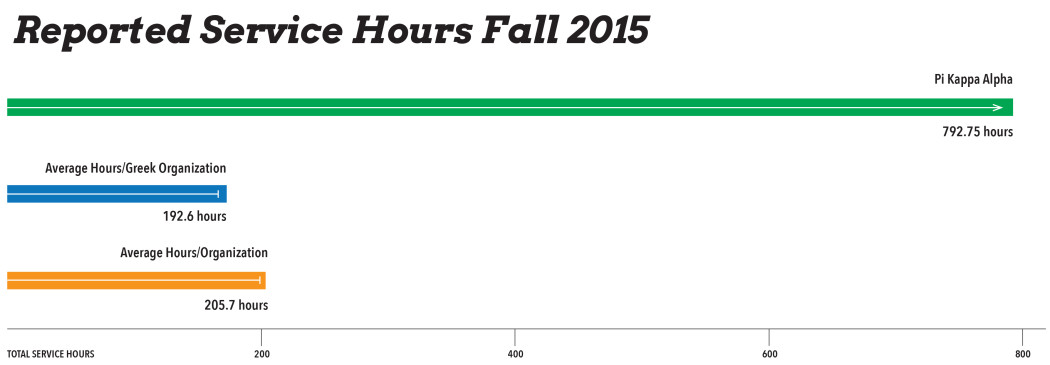Pike reports most service, hours from campus organizations under-reported
In fall 2015, Utah State’s chapter of Pi Kappa Alpha reported more service hours than any other organization on campus.
Students report their service hours through Aggies Giving Service — they specify how many hours they gave and through what organization. On average, each group gave 205.7 hours last semester. At 797.75 hours, Pike had significantly more than the runner-up, hackUSU, which had 555 hours.
Greek leaders often stop by the Val R. Christensen Service Center to learn about service opportunities.
“Among all the Greeks, someone is always checking in, but I feel like Pike is the one that checks in the most often,” said Nelda Ault, community service coordinator for the service center. “But all the Greeks are very good about being involved, as far as service goes.”
Kevin Webb, the associate director for student involvement and the Greek adviser, said service is a core principal of most Greek organizations.
“In all honesty, Pike probably has the most because they’re doing the best of reporting them. I’m not saying they don’t overall — that just means they’re doing the best job reporting them,” Webb said.
Many large organizations reported a small number of hours, and Ault said a lot of service goes unreported.
“I think a lot of it has to do with turnover. Student leadership turns over every year or every semester, even, and word doesn’t get passed along to the next person,” Ault said.
Leah Calder, service vice president for USUSA, said she thinks students have so many small things on their to-do lists that — while it only takes a few minutes — students just don’t get around to reporting their hours.
“Doing service is one thing, then telling people to report it is a whole other beast,” she said. “It gets put down at the bottom of the totem pole, as far as priorities go. So I think that’s the main issue.”
Students can print off a transcript of their hours to use when applying for jobs, internships or graduate school. Calder said it is also rewarding to look back and see how much service she gives.
Reporting service hours isn’t just advantageous for students, though. The service center is working toward a Carnegie Community Engagement classification, which would make grants easier to get. The application process starts in 2019, and the classifications are assigned in 2020.
“In applications, they always need numbers. Service is just a hard thing to quantify,” Ault said. “The best thing you can do is say how many hours people put in, how many people were involved, and how many people had their lives changed. Other than that, you can’t put a number to it.”
The service impact that USU has is important to its image, Ault said, and it benefits students and the university to report hours.
“I think students should just get in the habit of doing it, because it’s doing you a service in the future,” Calder said.
To report service hours, students can visit usu.edu/ags.
— brennakelly818@gmail.com


Congratulations members of Pi Kappa Alpha. Great job at supporting the community and also ensuring that you properly report the hours.
On another note, I find it very disheartening that people’s first reaction is to challenge and minimize the chapter’s contribution by saying that other organizations are under reported. I would love to see an article that highlights Pike’s contributions and interviews chapter members on their experiences and how to encourage other USU students to follow the same example. Stop discriminating fraternities and sororities and start encouraging them to do more.
Go Aggies.